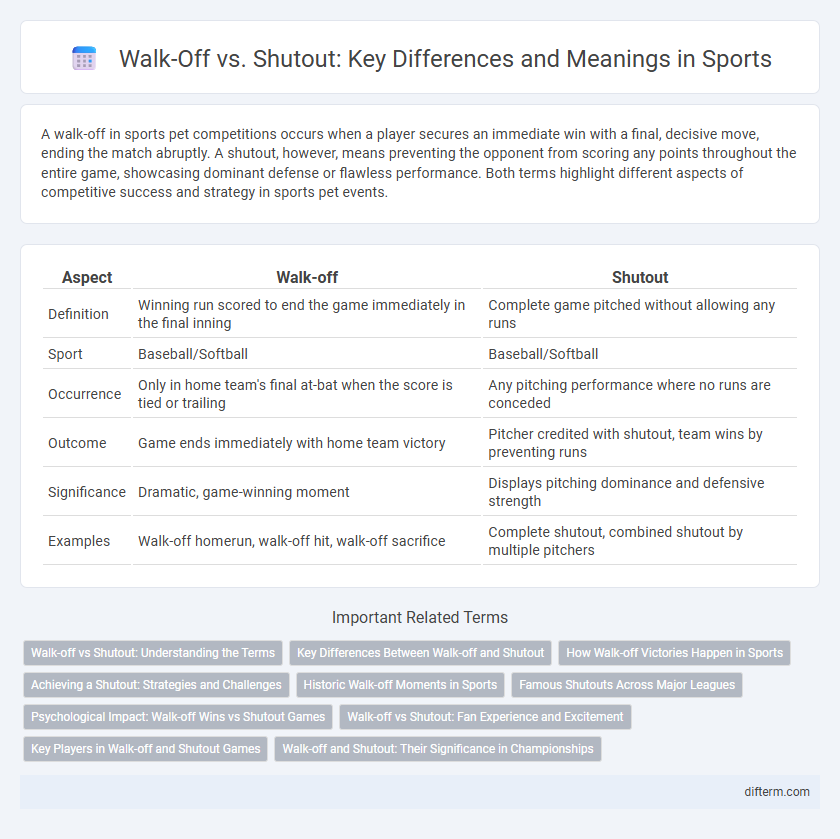A walk-off in sports pet competitions occurs when a player secures an immediate win with a final, decisive move, ending the match abruptly. A shutout, however, means preventing the opponent from scoring any points throughout the entire game, showcasing dominant defense or flawless performance. Both terms highlight different aspects of competitive success and strategy in sports pet events.
Table of Comparison
| Aspect | Walk-off | Shutout |
|---|---|---|
| Definition | Winning run scored to end the game immediately in the final inning | Complete game pitched without allowing any runs |
| Sport | Baseball/Softball | Baseball/Softball |
| Occurrence | Only in home team's final at-bat when the score is tied or trailing | Any pitching performance where no runs are conceded |
| Outcome | Game ends immediately with home team victory | Pitcher credited with shutout, team wins by preventing runs |
| Significance | Dramatic, game-winning moment | Displays pitching dominance and defensive strength |
| Examples | Walk-off homerun, walk-off hit, walk-off sacrifice | Complete shutout, combined shutout by multiple pitchers |
Walk-off vs Shutout: Understanding the Terms
Walk-off and shutout are pivotal terms in baseball, indicating distinct game outcomes. A walk-off occurs when the home team scores the winning run in the final inning, immediately ending the game. In contrast, a shutout signifies a complete game pitched without allowing the opposing team any runs.
Key Differences Between Walk-off and Shutout
A walk-off occurs when the home team scores the winning run in the bottom of the final inning, immediately ending the game, while a shutout is a complete game pitched without allowing the opposing team to score any runs. Key differences include the walk-off's emphasis on a dramatic game-ending play versus the shutout's demonstration of pitching dominance and defensive efficiency throughout the entire game. Walk-offs highlight clutch hitting and late-inning pressure, whereas shutouts underscore consistent defensive control and endurance by the pitcher and team.
How Walk-off Victories Happen in Sports
Walk-off victories occur when the home team scores the winning run or point in the final inning or moments of a game, immediately ending the contest and securing an instant win. This dramatic event typically happens in baseball when a player delivers a hit, walk, or error that allows the winning run to cross home plate, creating an exciting conclusion. Unlike shutouts, where one team prevents the other from scoring throughout the entire match, walk-offs hinge on last-minute heroics that abruptly determine the outcome.
Achieving a Shutout: Strategies and Challenges
Achieving a shutout in sports requires exceptional defensive coordination, pitcher stamina, and strategic pitch selection to prevent any scoring by the opposing team. Key challenges include maintaining consistent focus throughout the game, managing fatigue, and adapting to hitters' tendencies to minimize offensive opportunities. Effective communication between pitchers, catchers, and fielders enhances situational awareness, increasing the likelihood of a successful shutout.
Historic Walk-off Moments in Sports
Historic walk-off moments in sports capture dramatic game-ending victories, often etching players' names into championship lore. Iconic examples include Bill Mazeroski's 1960 World Series walk-off home run, the first ever in Series history, and Kirk Gibson's 1988 walk-off home run despite injuries, symbolizing resilience. These moments contrast with shutouts, where defensive dominance prevents scoring, but walk-offs deliver sudden, thrilling conclusions that define careers and excite fans globally.
Famous Shutouts Across Major Leagues
Famous shutouts across major leagues include Nolan Ryan's 16-strikeout no-hitter in MLB and Jake Arrieta's historic no-hitter for the Chicago Cubs, demonstrating pitching dominance. In the NHL, Martin Brodeur's record 125 shutouts highlight exceptional goaltending prowess. These performances showcase the critical impact of shutouts in defining legendary careers in professional sports.
Psychological Impact: Walk-off Wins vs Shutout Games
Walk-off wins generate intense psychological momentum, boosting team confidence and energizing players by delivering victory in dramatic fashion. Shutout games reinforce defensive strength and mental resilience, fostering a sense of control and dominance throughout the match. The contrasting psychological impacts reflect how walk-offs emphasize clutch performance under pressure, while shutouts highlight sustained focus and discipline.
Walk-off vs Shutout: Fan Experience and Excitement
Walk-off wins deliver an intense surge of excitement, as fans erupt in celebration instantly when the home team clinches victory in the final inning, creating memorable and emotionally charged moments. Shutouts, while less dramatic in the concluding moments, captivate fans through dominant pitching performances that showcase strategic excellence and control throughout the entire game. The walk-off's sudden thrill contrasts with the appreciation of a shutout's sustained mastery, offering distinct but equally compelling fan experiences.
Key Players in Walk-off and Shutout Games
Key players in walk-off games often exhibit clutch performance, delivering game-winning hits or decisive plays in the final innings, with hitters like David Ortiz and Derek Jeter historically excelling in these high-pressure moments. In shutout games, dominant pitchers such as Nolan Ryan and Sandy Koufax showcase superior control and stamina by preventing the opposing team from scoring any runs throughout the entire contest. Both scenarios highlight pivotal contributions, where offensive heroes seal the victory in walk-offs, while elite pitchers enforce defensive mastery in shutouts.
Walk-off and Shutout: Their Significance in Championships
Walk-off wins, where a team scores the winning run in the final inning, create dramatic, memorable moments that often define championship legacies. Shutouts, showcasing dominant pitching and defense by preventing opponents from scoring throughout the game, highlight a team's control and resilience in high-stakes matches. Both walk-offs and shutouts carry immense significance in championships, symbolizing clutch performance and strategic mastery critical to securing titles.
Walk-off vs Shutout Infographic

 difterm.com
difterm.com